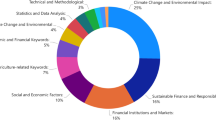Abstract
This study uses a quantitative methodology to investigate how the rise of digital money has affected efforts to increase green energy use in China. This work contributes to the body of knowledge by using a number of empirical methods, such as regression analysis, parametric quantile estimation, stability diagnostic tests, and sensitivity analysis. This study’s results further demonstrate the importance of digital financing in easing the adoption of renewable energy sources throughout China. Financing alternatives for renewable energy projects have increased as a result of digital finance’s integration of digital technology with financial services. A wider range of investors has been attracted through crowdfunding, peer-to-peer lending, and other alternative financing models made possible by digital platforms, allowing the development of small and medium-sized renewable energy projects that may have had trouble securing funding through more traditional channels. The impact of digital finance on energy management and optimization is also investigated. As a result, renewable energy sources have been more widely adopted due to increased energy efficiency, better grid integration, and more efficient energy delivery. This study presents substantial evidence of the beneficial benefits of digital finance on renewable energy use in China using rigorous empirical methodologies such as regression analysis, parametric quantile estimation, stability diagnostic tests, and sensitivity analysis. The results highlight the significance of using digital money to boost the use of renewable energy, lessen reliance on fossil fuels, and help create a greener, more sustainable future.
Similar content being viewed by others
Data availability
The data supporting this study’s findings are available on request.
References
Abbas J, Wang L, Belgacem SB, Pawar PS, Najam H, Abbas J (2023) Investment in renewable energy and electricity output: role of green finance, environmental tax, and geopolitical risk: Empirical evidence from China. Energy 269:126683
Ali K, Jianguo D, Kirikkaleli D (2023) How do energy resources and financial development cause environmental sustainability? Energy Rep 9:4036–4048
Cao S, Nie L, Sun H, Sun W, Taghizadeh-Hesary F (2021) Digital finance, green technological innovation and energy-environmental performance: evidence from China’s regional economies. J Clean Prod 327:129458
Chang J (2022) The role of digital finance in reducing agricultural carbon emissions: evidence from China’s provincial panel data. Environ Sci Pollut Res 29(58):87730–87745
Chen P (2022) Is the digital economy driving clean energy development?-New evidence from 276 cities in China. J Clean Prod 372:133783
Cheng Y, Lv K, Zhu S (2023) How does digital financial inclusion promote green total factor productivity in China? An empirical analysis from the perspectives of innovation and entrepreneurship. Process Saf Environ Protect 174:403–413
Cui J, Wang W, Chen Z, Ren G, Gao X (2023) How digitalization and financial development impact eco-efficiency? Evidence from China. Environ Sci Pollut Res 30(2):3847–3861
Delina LL (2023) Fintech RE in a global finance centre: expert perceptions of the benefits of and challenges to digital financing of distributed and decentralised renewables in Hong Kong. Energy Res Soc Sci 97:102997
Ding X, Gao L, Wang G, Nie Y (2022) Can the development of digital financial inclusion curb carbon emissions? Empirical test from spatial perspective. Front Environ Sci 10:2093
Dong K, Taghizadeh-Hesary F, Zhao J (2022) How inclusive financial development eradicates energy poverty in China? The role of technological innovation. Energy Econ 109:106007
Du M, Hou Y, Zhou Q, Ren S (2022) Going green in China: how does digital finance affect environmental pollution? Mechanism discussion and empirical test. Environ Sci Pollut Res 29(60):89996–90010
Feng S, Chong Y, Li G, Zhang S (2022) Digital finance and innovation inequality: evidence from green technological innovation in China. Environ Sci Pollut Res 29(58):87884–87900
Fu Z, Zhou Y, Li W, Zhong K (2023) Impact of digital finance on energy efficiency: Empirical findings from China. Environ Sci Pollut Res 30(2):2813–2835
Hao X, Li Y, Ren S, Wu H, Hao Y (2023a) The role of digitalization on green economic growth: does industrial structure optimization and green innovation matter? J Environ Manag 325:116504
Hao Y, Wang C, Yan G, Irfan M, Chang CP (2023b) Identifying the nexus among environmental performance, digital finance, and green innovation: new evidence from prefecture-level cities in China. J Environ Manag 335:117554
Hao X, Wen S, Xue Y, Wu H, Hao Y (2023c) How to improve environment, resources and economic efficiency in the digital era? Resour Policy 80:103198
Hepburn C, Qi Y, Stern N, Ward B, Xie C, Zenghelis D (2021) Towards carbon neutrality and China’s 14th Five-Year Plan: clean energy transition, sustainable urban development, and investment priorities. Environ Sci Ecotechnol 8:100130
Hu J, Zhang H, Irfan M (2023) How does digital infrastructure construction affect low-carbon development? A multidimensional interpretation of evidence from China. J Clean Prod 396:136467
Iqbal S, Bilal AR (2021) Energy financing in COVID-19: how public supports can benefit? China Finance Rev Int 12(2):219–240
Iqbal S, Bilal AR, Nurunnabi M, Iqbal W, Alfakhri Y, Iqbal N (2021) It is time to control the worst: testing COVID-19 outbreak, energy consumption and CO 2 emission. Environ Sci Pollut Res 28:19008–19020
Khan MA, Rehan R (2022) Revealing the impacts of banking sector development on renewable energy consumption, green growth, and environmental quality in China: does financial inclusion matter? FrontEnergy Res 10:941
Lee CC, Wang F (2022) How does digital inclusive finance affect carbon intensity? Econ Anal Policy 75:174–190
Lee CC, Zhang J, Hou S (2023) The impact of regional renewable energy development on environmental sustainability in China. Resour Policy 80:103245
Li G, Wu H, Jiang J, Zong Q (2023) Digital finance and the low-carbon energy transition (LCET) from the perspective of capital-biased technical progress. Energy Econ 120:106623
Li G, Zhang R, Feng S, Wang Y (2022b) Digital finance and sustainable development: evidence from environmental inequality in China. Busi Strat Environ 31(7):3574–3594
Li W, Chien F, Ngo QT, Nguyen TD, Iqbal S, Bilal AR (2021) Vertical financial disparity, energy prices and emission reduction: empirical insights from Pakistan. J Environ Manage 294:112946
Li X, Shao X, Chang T, Albu LL (2022a) Does digital finance promote the green innovation of China’s listed companies? Energy Econ 114:106254
Lin B, Huang C (2023) How will promoting the digital economy affect electricity intensity? Energy Policy 173:113341
Lin B, Ma R (2022) How does digital finance influence green technology innovation in China? Evidence from the financing constraints perspective. J Environ Manag 320:115833
Liu Y, Xiong R, Lv S, Gao D (2022) The impact of digital finance on green total factor energy efficiency: evidence at China’s city level. Energies 15(15):5455
Lyu K, Yang S, Zheng K, Zhang Y (2023) How does the digital economy affect carbon emission efficiency? Evidence from energy consumption and industrial value chain. Energies 16(2):761
Ma R, Li F, Du M (2022) How does environmental regulation and digital finance affect green technological innovation: evidence from China. Front Environ Sci 782
Muganyi T, Yan L, Sun HP (2021) Green finance, fintech and environmental protection: evidence from China. Environ Sci Ecotechnol 7:100107
Ozturk I, Ullah S (2022) Does digital financial inclusion matter for economic growth and environmental sustainability in OBRI economies? An empirical analysis. Resour Conserv Recycl 185:106489
Qin X, Wu H, Li R (2022) Digital finance and household carbon emissions in China. China Econ Rev 76:101872
Razzaq A, Sharif A, Ozturk I, Skare M (2023) Asymmetric influence of digital finance, and renewable energy technology innovation on green growth in China. Renew Energy 202:310–319
Ren S, Hao Y, Xu L, Wu H, Ba N (2021) Digitalization and energy: how does internet development affect China’s energy consumption? Energy Econ 98:105220
Ren Y, Li B, Liang D (2023) Impact of digital transformation on renewable energy companies’ performance: evidence from China. Front Environ Sci 10:2702
Shahbaz M, Wang J, Dong K, Zhao J (2022) The impact of digital economy on energy transition across the globe: the mediating role of government governance. Renew Sustain Energy Rev 166:112620
Tang D, Chen W, Zhang Q, Zhang J (2023) Impact of digital finance on green technology innovation: the mediating effect of financial constraints. Sustainability 15(4):3393
Tu CA, Chien F, Hussein MA, RAMLI MM YA, S. PSI MS, Iqbal S, Bilal AR (2021). Estimating role of green financing on energy security, economic and environmental integration of BRI member countries. The Singapore Economic Review, 1–19
Wang X, Wang X, Ren X, Wen F (2022) Can digital financial inclusion affect CO2 emissions of China at the prefecture level? Evidence from a spatial econometric approach. Energy Econ 109:105966
Wang Y, Wu Q, Razi U (2023) Drivers and mitigants of resources consumption in China: discovering the role of digital finance and environmental regulations. Resour Policy 80:103180
Wu M, Guo J, Tian H, Hong Y (2022) Can digital finance promote peak carbon dioxide emissions? Evidence from China. Int J Environ Res Public Health 19(21):14276
Wu Y, Huang S (2022) The effects of digital finance and financial constraint on financial performance: firm-level evidence from China’s new energy enterprises. Energy Econ 112:106158
Yang C, Masron TA (2022) Impact of digital finance on energy efficiency in the context of green sustainable development. Sustainability 14(18):11250
Yang G, Xiang X, Deng F, Wang F (2023) Towards high-quality development: how does digital economy impact low-carbon inclusive development?: mechanism and path. Environ Sci Pollut Res:1–26
Yin X, Qi L, Zhou J (2023) The impact of heterogeneous environmental regulation on high-quality economic development in China: based on the moderating effect of digital finance. Environ Sci Pollut Res 30(9):24013–24026
Yu M, Tsai FS, Jin H, Zhang H (2022) Digital finance and renewable energy consumption: evidence from China. Financial Innov 8(1):58
Zhang D, Mohsin M, Taghizadeh-Hesary F (2022) Does green finance counteract the climate change mitigation: asymmetric effect of renewable energy investment and R&D. Energy Econ 113:106183
Zhang Y, Umair M (2023) Examining the interconnectedness of green finance: an analysis of dynamic spillover effects among green bonds, renewable energy, and carbon markets. Environ Sci Pollut Res. https://doi.org/10.1007/s11356-023-27870-w
Zhao H, Yang Y, Li N, Liu D, Li H (2021) How does digital finance affect carbon emissions? Evidence from an emerging market. Sustainability 13(21):12303
Zhao L, Saydaliev HB, Iqbal S (2022) Energy financing, COVID-19 repercussions and climate change: implications for emerging economies. Climate Change Economics 13(03):2240003
Zheng X, Zhou Y, Iqbal S (2022) Working capital management of SMEs in COVID-19: role of managerial personality traits and overconfidence behavior. Econ Anal Policy 76:439–451
Zhong S, Li A, Wu J (2022) How does digital finance affect environmental total factor productivity: a comprehensive analysis based on econometric model. Environ Dev 44:100759
Zhu J, Li Z (2021) Can digital financial inclusion effectively stimulate technological Innovation of agricultural enterprises?—A case study on China. Natl Account Rev 3:398–421
Author information
Authors and Affiliations
Contributions
Conceptualization, methodology, and writing—original draft, data curation, visualization, editing: Jing Ma.
Corresponding author
Ethics declarations
Ethical approval and consent to participate
The authors declared that they have no known competing financial interests or personal relationships, which seem to affect the work reported in this article. We declare that we have no human participants, human data, or human issues.
Consent for publication
We do not have any person’s data in any form.
Competing interests
The authors declare no competing interests.
Additional information
Responsible Editor: Nicholas Apergis
Publisher’s note
Springer Nature remains neutral with regard to jurisdictional claims in published maps and institutional affiliations.
Rights and permissions
Springer Nature or its licensor (e.g. a society or other partner) holds exclusive rights to this article under a publishing agreement with the author(s) or other rightsholder(s); author self-archiving of the accepted manuscript version of this article is solely governed by the terms of such publishing agreement and applicable law.
About this article
Cite this article
Ma, J. How digital finance promotes renewable energy consumption in China?. Environ Sci Pollut Res 30, 102490–102503 (2023). https://doi.org/10.1007/s11356-023-29504-7
Received:
Accepted:
Published:
Issue Date:
DOI: https://doi.org/10.1007/s11356-023-29504-7




